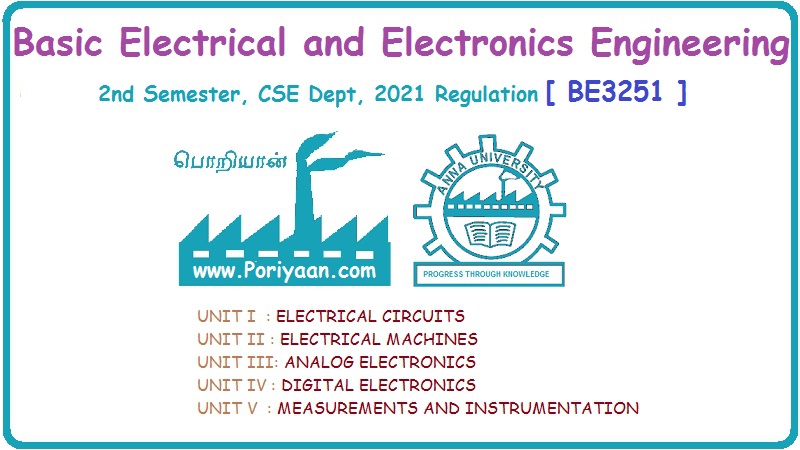Basic Electrical and Electronics Engineering: Unit II: Electrical Machines
EMF Equation of a Transformer
The primary winding of a transformer excited by alternating voltage V1, it produce an alternating flux ϕ.
EMF
EQUATION OF A TRANSFORMER
The
primary winding of a transformer excited by alternating voltage V1, it
produce an alternating flux ϕ. The primary winding has N1 number of
turns. The flux links the secondary winding through the common magnetic core.
It produces induced emf in the secondary. Let us derive the equation for E1
and E2.
N1
= no.of turns in primary
N2
= no.of turns in secondary
ϕm
= maximum flux in core in webers
=Bm
× A
ƒ
= frequency of AC input in Hz
As
the Figure 3.48 shows, flux increases from its zero value to maximum value ϕm
in one quater of the cycle.
Average
rate of change of flux =
= 4ƒϕm
wb/s
rate
of change of flux per turn means induced emf in volts.
Average
emf/turn = 4ƒϕm volts
If
flux ϕ varies sinusoidally, then rms value of induced emf is obtained by
multiplying the average value with form factor.
From
factor = rms value/average value = 1.11
rms
value of emf/turn= 1.11 x 4ƒϕm
=
4.44 ƒϕm volts
RMS
value of the induced emf in the whole of primary winding
=
[induced emf/turn] × No.of primary winding
=
4.44 ƒϕm N1
E1
= 4.44 ƒBm A N1 ……….(1)
Similarly
rms value of the emf induced in secondary is
E2
= 4.44 ƒ N2 ϕm
E2
= 4.44 ƒ Bm AN2………….(2)
From
equation (1) and (2) that
E1/N1
= E2/N2 = 4.44 ƒ ϕm
It
means that emf/turn is the same in both the primary and secondary windings.
In
an ideal transformer on no-load
V1
= E1 and E2 = V2.
Basic Electrical and Electronics Engineering: Unit II: Electrical Machines : Tag: : - EMF Equation of a Transformer
Related Topics
Related Subjects
Basic Electrical and Electronics Engineering
BE3251 2nd semester Mechanical Dept | 2021 Regulation | 2nd Semester Mechanical Dept 2021 Regulation
Basic Electrical and Electronics Engineering
BE3251 2nd Semester CSE Dept 2021 | Regulation | 2nd Semester CSE Dept 2021 Regulation

